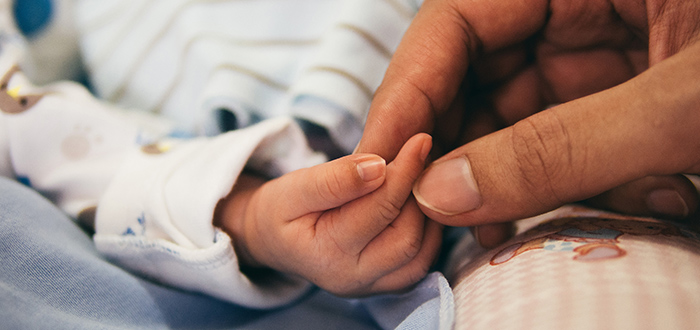Caring for a family with a new baby is a familiar process for most people. You marvel at the cheeks. Oh, those cheeks! You hand sanitize your entire body before entering a new baby’s personal space. You bring meals and diapers and cute tiny outfits to small group.
But, the adoptive family needs a different kind of care. The adoptive family might not have a happy, healthy baby. The child might be older. There are often developmental delays or special needs. The adoptive family might not even feel like a family at first.The standard oohhs and ahhs aren’t always the best way to approach the family who just adopted a child.
It is powerful when you, as a group leader, can be sensitive to the needs this family is experiencing and lead your group to love them.
Here are three ways to love the adoptive family in your group.
Ding Dong Dash
Just last month, I returned home from China, bringing with me a three-and-a-half-year-old deaf child who is now our daughter. Before leaving, a friend from church casually asked if I’d let her set up a “ding, dong, dash” meal train for us when we returned.
Because we adopted an older child with a traumatic history, we needed to keep her home and keep our home free of visitors for at least six weeks. So, my friend set up our meal train and explained our situation—we couldn’t have house guests. She requested that everyone involved ring the doorbell, leave the food on the stoop, and bolt.
Let me tell you, hot food delivered to your doorstep every night with no expectation of hospitality is one of the greatest forms of love I’ve ever been shown.
If you haven’t heard of it, bookmark mealtrain.com. It is one of the best ways to love a family that is going through a transition.
As a small group leader, you have the opportunity to take the pressure and awkwardness off of your needy family and be the one they can be specific and picky with. Then, relay their message and make sure that the other group members who sign up ding, dong, and dash with care.
Be Patient
Families with adopted children test out the waters of life in a different way than families with newborn biological babies do. With a newborn, you’re careful to avoid germs, but the adoptive family avoids trauma, drama, and environments that might trigger fear or distrust in the child.
With the adopted child, parents are looking for bonding and attachment. The parent needs to learn to love the child and the child needs to learn how to be loved. There is a lot of training that goes into adopting a child. Recommendations vary depending on which country you adopt from, how old your child is, their history, etc., but there is always the need for intentionality when putting together people who have not been a family before.
That might mean a new adoptive family doesn’t attend group for a while as they focus on building the home. It may mean they come in shifts so that child spends less time out of the home. It may mean that when they finally do come to the group together, they have a lot of weird requests about what you say and do to help the child respond to a new group of people in a healthy way.
Let the family lead when it comes to how much they want to invite interaction in the early days of their adoption. This creates an expectation for patience within the group.
Give Grace
Make an effort to extend extra grace to the adoptive family and model it for other group members. For adoptive parents, emotions can be all over the place at first. Life can be all over the place.
It was for me.
This whole beautiful experience has been a roller coaster that has left me feeling weaker and needier than ever in my life. I used to be punctual. I used to be reliable. I used to be speedy at responding to all communication. Now, I’m relearning how to do life with a new child and a whole new set of emotions and family dynamics. Your group members, in the midst of this life change, may not be themselves. They might not remember the group snack. They might not return your emails within a 24-hour window. They may cry more than you wish they would cry. Give grace. Offer help. And use the time of adoption transition to show your group the love of Jesus.
Scarlet Hiltibidal is a writer living in Nashville, TN. Scarlet has a degree in biblical counseling and worked as a Christian schoolteacher before she started writing. She has written for and managed several online publications. Currently, she does freelance writing for various Christian publishers and produces small group curriculum for children. Scarlet is wife to Brandon, who is part of the Groups Ministry Team at Lifeway, and Mommy to her daughters, Ever Grace, Brooklyn Hope, and Sawyer Joy. Visit her blog at scarlethiltibidal.com and follow her on Twitter and Instagram @ScarletEH.





Leave a Comment: